7. Buster Keaton
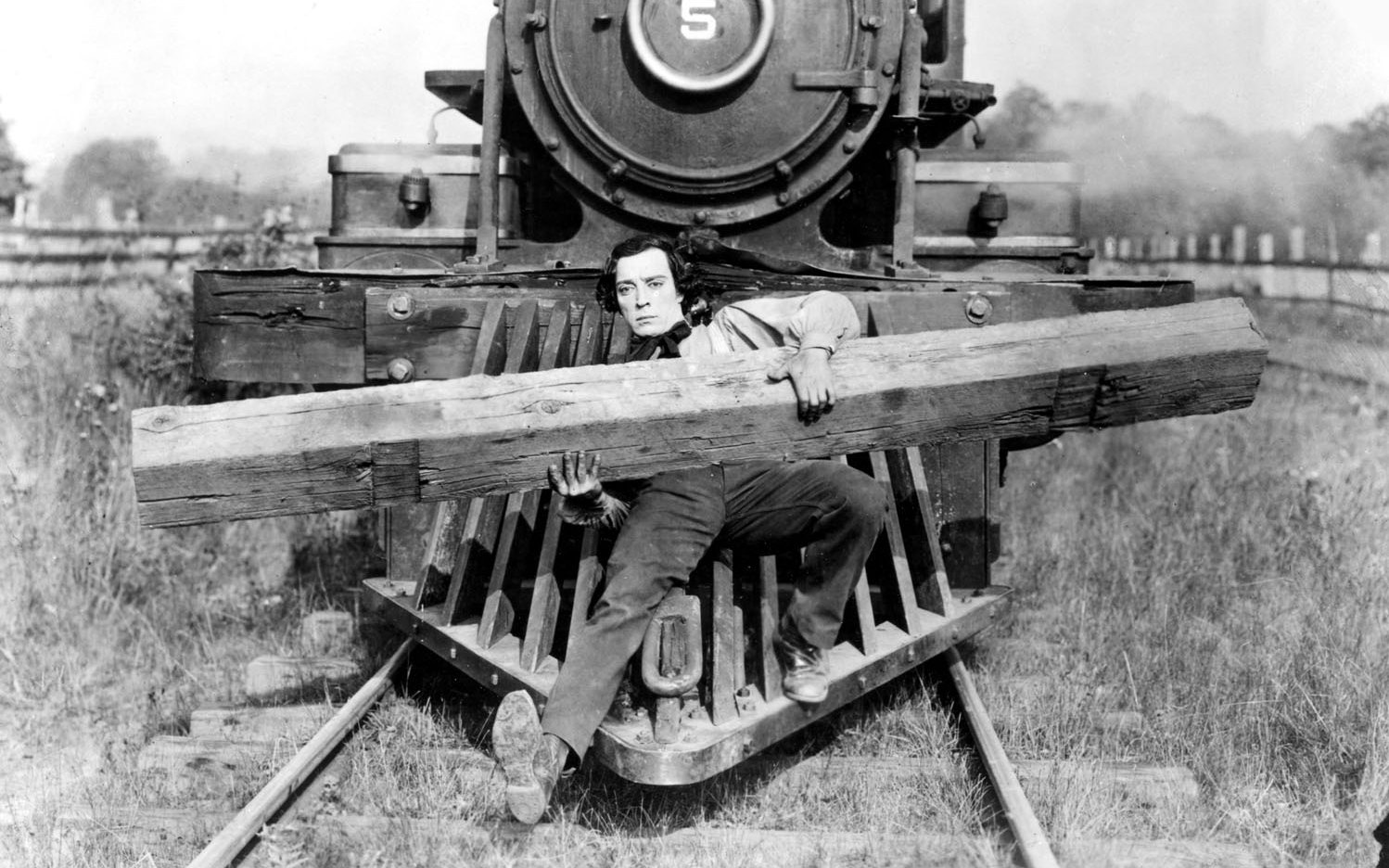
Widely known as “the Great Stone Face” owing to his stoic expression of deadpan and implacable upset, Buster Keaton (Oct. 4, 1895 – Feb. 1, 1966) was a stunt comedian who cut his teeth on Vaudeville before establishing himself on the silver screen where he was, for a period during the late 1920s and early 1930s at any rate, thought to be Charlie Chaplin’s equal as both a performer and formidable filmmaker. In the words of Roger Ebert, “[Keaton’s] extraordinary period from 1920 to 1929, [when] he worked without interruption on a series of films that make him, arguably, the greatest actor–director in the history of the movies.”
Keaton’s greatest films, which not only hold up today but still contain an unerring sense of awe and inspired comedy, include the stunning Sherlock Jr. (1924), his masterpiece of comic, train-derailing mayhem, often considered one of the greatest films of all time, The General (1926), and 1928’s highly regarded The Cameraman.
From the classical era of Hollywood there are few performers as highly regarded and with a legacy as superlative as Keaton’s. While his time in the spotlight was finite, owing largely to his struggle with alcoholism, and his inability to properly transition from the silent era (a fate which befell many Hollywood stars), but thankfully, he did see a revival of his career and stature as a great filmmaker and funnyman, being honored with an Academy Award for his lifetime achievements in 1959.
6. Peter Sellers
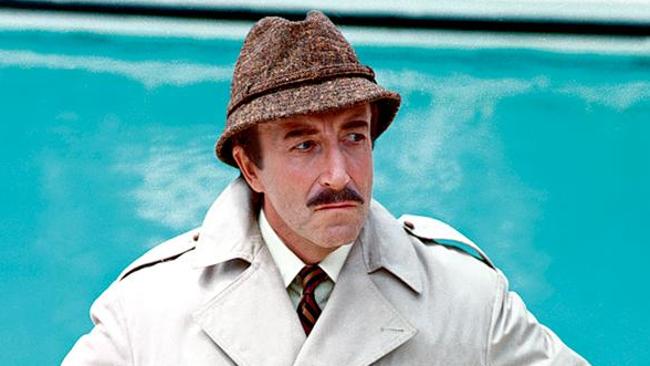
Described by English filmmakers the Boulting brothers as “the greatest comic genius this country has produced since Charles Chaplin,” Peter Sellers was perhaps best known as the bumbling Chief Inspector Clouseau in Blake Edwards’ The Pink Panther films (1963 to 1978). But that said, Sellers had an expansive career in comedy, beginning with the influential BBC Radio comedy series The Goon Show (1951 to 1960) before flexing his acting muscles in cinema.
While Sellers is dominantly thought of as a comedic actor, he did adventure into many other film genres, but his most notable works include two with Stanley Kubrick; Lolita (1962) and his multiple roles in Dr. Strangelove (1964). He’s also fondly remembered from What’s New, Pussycat? (1965), Casino Royale (1967), The Party (1968), and Being There (1979).
A versatile actor, Sellers regularly played multiple roles in his films (he would have played a fourth role in Dr. Strangelove if he hadn’t sprained his ankle during a stunt sequence), sometimes going “method” in his approach and his transformative role as Chauncey Gardiner being one of these, is surely one of the great performances from that, or any era.
Sellers’ frequently satirical and often pitch-dark humor has helped his numerous roles to feel very modern, even after several decades, and he’s influenced many comics including Monty Python, Rob Brydon, Sacha Baron Cohen, Christopher Guest, Michael McKean, and Harry Shearer amongst many others.
5. Lucille Ball

While largely known as a legendary television star (her self-produced situational comedies like I Love Lucy [1951 to 1957] and others of its ilk were groundbreaking and trend-setting), Lucille Ball (August 6, 1911 – April 26, 1989) is too much of an icon not to be listed near the top of any list such as this, and her lengthy career was punctuated with many notable appearances on the silver screen.
Ball began as a model in the late 1920s before Broadway made her a star. By the 30s and 40s she’d been contracted at RKO and made several pictures, including Follow the Fleet (1936), the Marx Brothers comic caper Room Service (1938), and most notably Dorothy Alzar’s golden era Hollywood classic Dance, Girl, Dance (1940).
It was around the time that Ball was doing Alzar’s film that she met Desi Arnaz, who would not only become her husband but also creative partner and make TV history together for the next 20 years (they would divorce in 1960).
Throughout her life Ball received many prestigious awards (including four Emmy Awards), and garnered many posthumously as well, including a commemorative postage stamp and a 2001 induction into the National Women’s Hall of Fame, amongst others.
“I’m happy that I have brought laughter,” Ball once said, “because I have been shown by many the value of it in so many lives, in so many ways.”
4. John Cleese
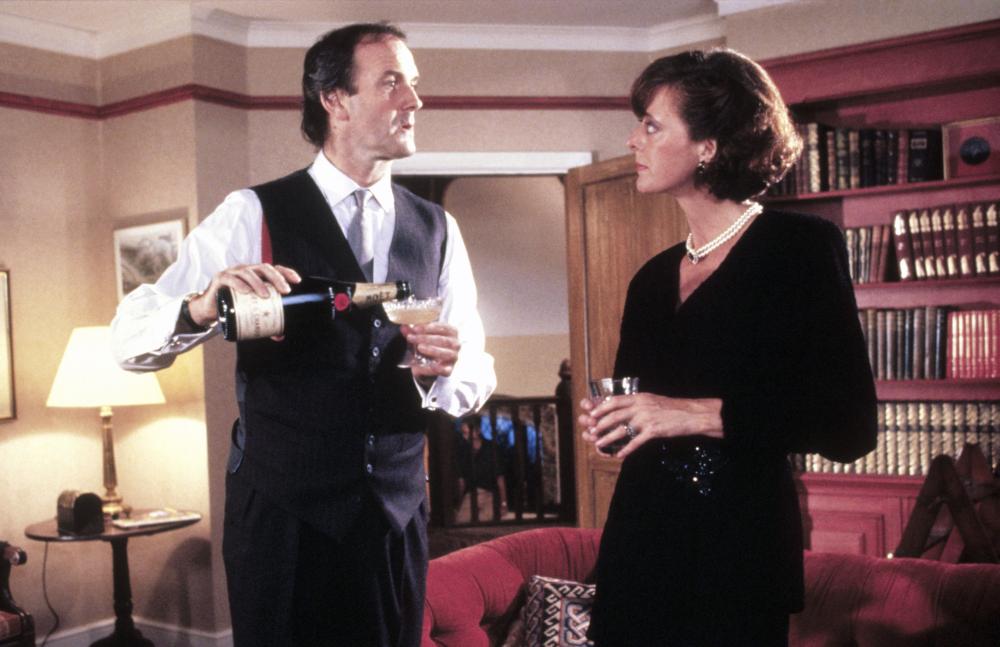
“And now for something completely different…”
While his numerous beloved and beastly serrated comedy performances with Monty Python, be they on the big screen, the TV screen, or those now gone but forever remembered live performances are perhaps what John Cleese is best known for, for me the phrase that immediately leaps to mind when I think of him will always be: “Don’t mention the war!”
That line, of course, is from his brilliant BBC sitcom Fawlty Towers (1975 to 1979), but of course Monty Python’s Flying Circus was a sketch show long before that (1969 to 1974) and he also did four very funny (and very naughty) films with those lads as follows: And Now for Something Completely Different (1971), Monty Python and the Holy Grail (1975), Life of Brian (1979) and The Meaning of Life (1983).
Cleese, a rather tall, often gangly, always reliably hilarious fellow (and in the case of his Fawlty Towers alter ego Basil, just a light breeze away from a force ten shitstorm of inspired lunacy), while an intrinsic part of Python, also has a prolific career beyond those surrealist pisstakers, including such hits as Clockwise (1986), A Fish Called Wanda (1988), Erik the Viking (1989), Fierce Creatures (1997), the role of Nearly Headless Nick in the first two Harry Potter films, and scads of voice over work in numerous animated films (including the Shrek films).
Also a prolific screenwriter and producer, Cleese is also a brilliant self-defense instructor when it comes to staving off an attacker who might be armed with fresh fruit, and inspired insults such as: “Your mother was a hamster and you father smelled of elderberries!”
3. Robin Williams
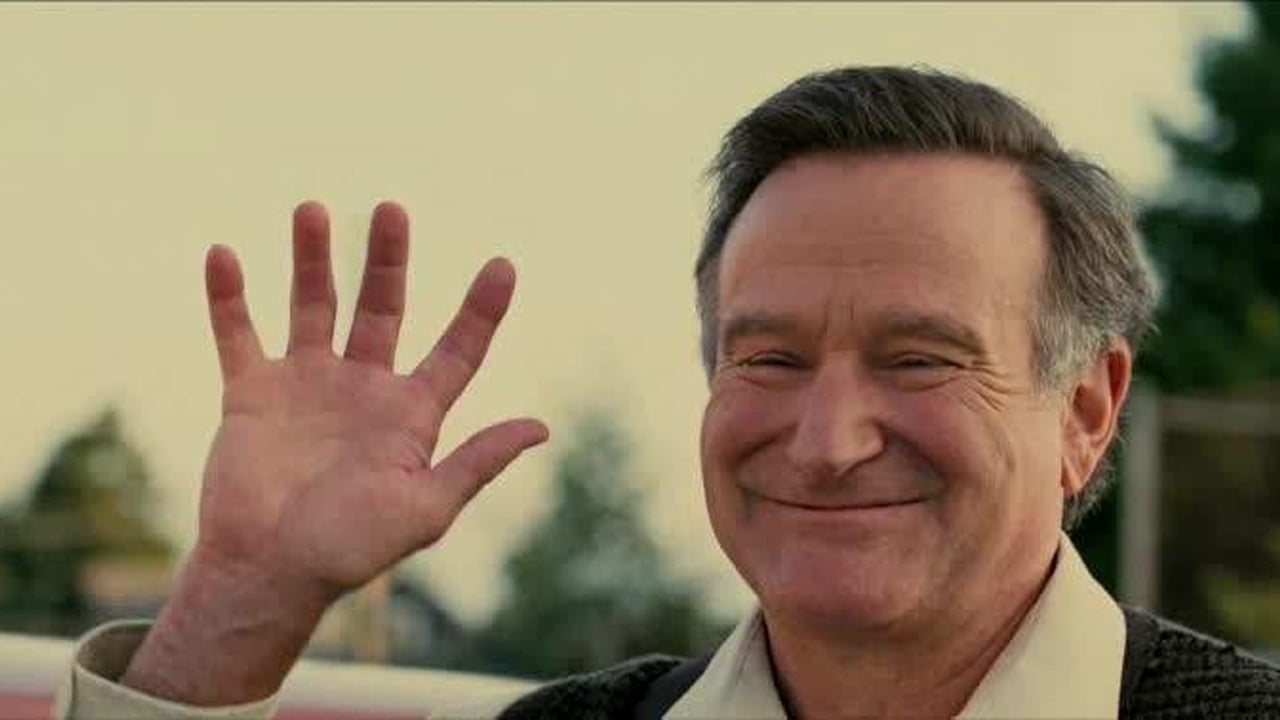
In the mid-70s the comic with the most startling and inspired stand-up routine in San Francisco was undoubtedly Robin Williams, where he lead a comedy renaissance. After a hilarious glorified cameo on the hit TV show Happy Days, Williams was given his own spinoff show called Mork & Mindy (1978 to 1982), where his oddly lovable alien Mork, stole America’s heart while also inducing a primetime television version of tickle torture. The role, while reasonably lightweight, allowed Williams to display his improvisational skills, which he would soon hone on the big screen.
Williams first leading role was rather lackluster and something of a fiasco in Robert Altman’s highly touted but poorly received Popeye (1980) but acclaim wasn’t far away as 1982’s The World According to Garp would showcase not just Williams’ comic chops but also his dramatic impulses (for all his manic impulses and zany antics Williams was a graduate of the Juilliard School).
Williams made a number of box-office and critical hits in films like Good Morning, Vietnam (1987), Dead Poets Society (1989), The Fisher King (1991), Aladdin (1992), Mrs. Doubtfire (1993), The Birdcage (1996), Good Will Hunting (1997) and Night at the Museum (2006), and nestled in there he also garnered an Academy Award, two Emmy Awards, seven Golden Globe Awards, two SAG Awards, and four Grammys. Yeah, not bad.
A beloved performer, philanthropist, mentor, his rapid-fire and off-the-cuff spontaneous style endeared him to everyone. He left the world far too soon at age 63, a final legacy of his warm and radiant life was to help spread a global conversation on mental health and altruism everywhere.
“You can’t look at any modern comic and say, ‘That’s the descendant of Robin Williams’, because it’s not possible to be a Robin Williams rip-off,” said Judd Apatow, adding, “[Williams] raised the bar for what it’s possible to do, and made an enormous amount of us want to be comedians.”
2. The Marx Brothers
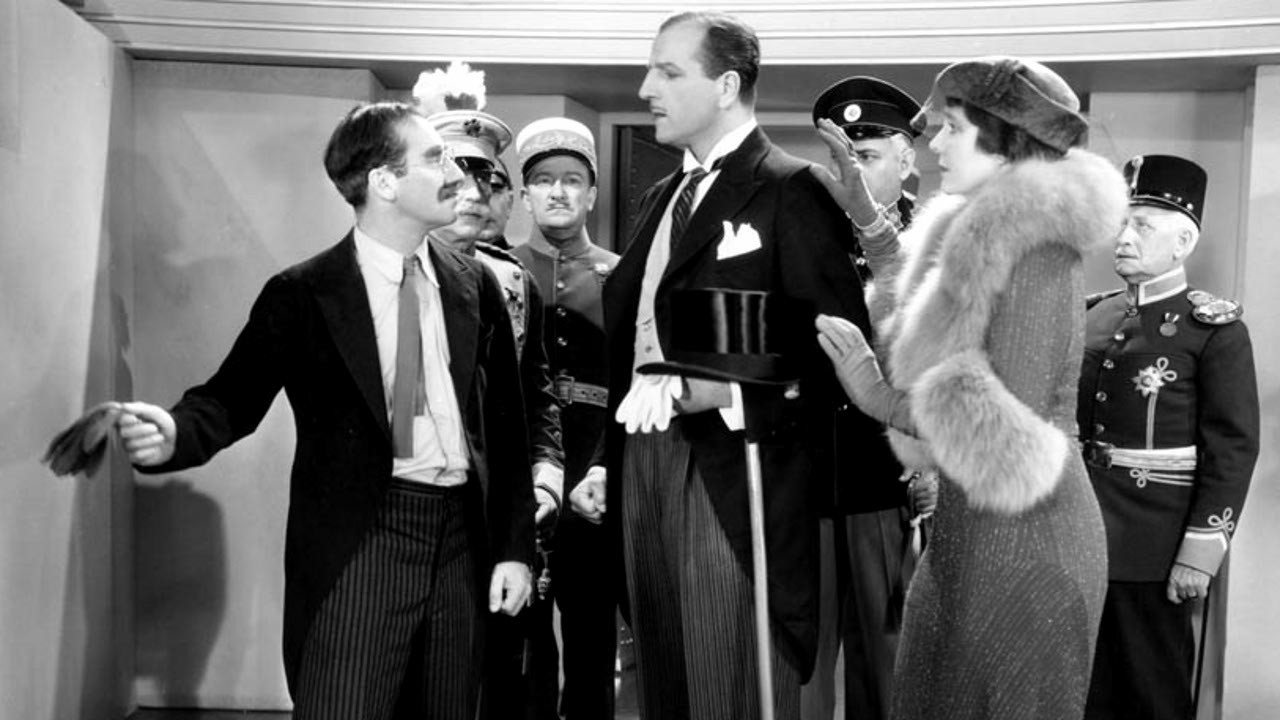
Comedic legends the Marx Brothers (yes, they really were all brothers) had an extraordinary careers that saw them find immense success first in vaudeville, then Broadway, then on the silver screen, and then with the advent of television, that, too. Of their thirteen films –– which were made between 1921 and 1949 –– five were considered mammoth box-office hits, each selected by the American Film Institute as among the top 100 comedy films of all time. Amongst their most memorable and influential films are 1930’s Animal Crackers (described by Salvador Dalí as “ the summit of the evolution of comic cinema”), 1933’s satirical masterpiece Duck Soup, 1935’s A Night at the Opera, and 1937’s A Day at the Races.
Universally known by their stage names: Groucho (perpetually wise-cracking while gesticulating with his ubiquitous cigar, painted-on black moustache, and bent-over funny walk), Harpo (mute, adorned with a curly wig, a god of mischief, forever chasing pretty girls, humoring children, beeping his horn, and striking his trademark harp whenever possible), Chico (the quick-witted punster, forever turning phrases into hilarious malaprops, and always finding time to famously shoot the keys of his piano), and Zeppo (the handsome and wholesome straight-man). These highly distinctive stage personas became comic archetypes, and their brand nihilistic humor would influence everyone from Woody Allen and Monty Python to Mr. Show and Sacha Baron Cohen.
By the late 1940s Chico and Harpo were essentially retired from show biz, as was Zeppo (though Harpo would make a few late career TV appearances, most memorably on an I Love Lucy episode in 1955), but Groucho would enjoy a very successful solo career, most notably re-inventing himself as the host of the highly-rated radio and television game show You Bet Your Life (spanning the years from 1947 to 1961).
Storied, iconic, and influential heroes of Classic Hollywood and beyond, the Marx Brothers were the only group to be honored amongst the AFI’s “100 Years…100 Stars” list of the top 25 male screen legends in American film history, and very rightly so.
To quote Woody Allen on his hero: “Some years back I came to the conclusion that Groucho Marx was the best comedian this country ever produced. Now I am more convinced than ever that I was right. I can’t think of a comedian who combined a totally original physical conception that was hilarious with a matchless verbal delivery. I believe there is a natural inborn greatness in Groucho that defies close analysis as it does with any genuine artist. He is simply unique in the same way that Picasso or Stravinsky are and I believe his outrageous unsentimental disregard for order will be equally as funny a thousand years from now.”
1. Charlie Chaplin
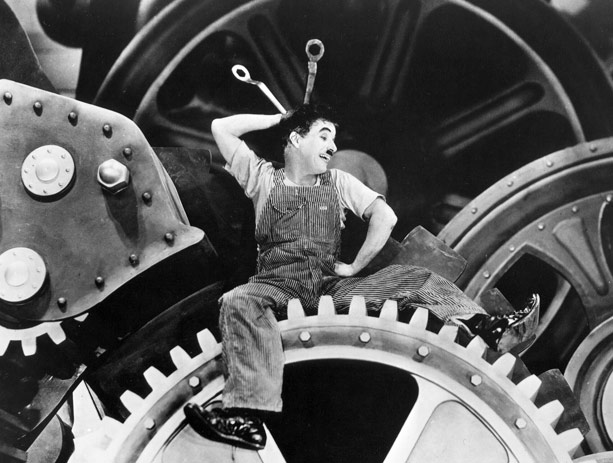
Almost impossible to distinguish from his great cinematic persona “the Tramp”––one of the most recognizable figures in the entire world––Charlie Chaplin is the very symbol for motion picture comedy. Having once said that his humor depends on getting the Tramp out of the maximum amount of trouble, he is still honored and respected today as the pinnacle of modern comedy. Surely this is largely due to how heroic, innocent, resistant, and venerated he is. The Tramp comes from a place of dereliction and abject poverty, and Chaplin regularly placed him in perilous situations that exaggerated themselves into satire and commentary on the human condition.
Born in London in 1889, Chaplin came from the kind of hardship and poverty that the Tramp would later spring from. From a young age Chaplin began honing his craft touring music halls and as a stage performer and comedian. When he was 18 he was well on his way to establishing himself as a gifted entertainer, even touring across the pond in America where, like his contemporaries the Marx Brothers, he rose to further prominence doing the vaudeville circuit. This lead him to the New York Motion Picture Company and Keystone Studios in 1913 and a move to Hollywood where his first one-reeler, Making a Living, was made in 1914. His Tramp character soon amassed an enthusiastic following and by 1918 he was recognized all over the globe. Wow!
1919 saw Chaplin co-found United Artists, and his feature films soon followed, starting with The Kid (1921), followed by A Woman of Paris (1923), The Gold Rush (1925), The Circus (1928), City Lights (1931) and Modern Times (1936) amongst them.
Unafraid to be political and even a little didactic, Chaplin famously satirised Adolf Hitler in his 1940 agitprop political satire The Great Dictator, and of his later works it’s fair to say that 1952’s Limelight, while not his final film, was his last truly great one.
An absolutely bursting fountain of talent Chaplin wrote, directed, produced, edited, starred in, and composed the music for nearly all of his films. He had a reputation as a perfectionist, and he often spent years on a single project. But with so many classics to his name, who can fault him?
Characterised by physical slapstick combined with an often maudlin pathos, the Tramp’s struggles against adversity, pessimism, and the modern machinations of society shaped his astonishing body of work. Social and political themes abound in his work, side by side with many deeply personal and often autobiographical elements. Chaplin regularly and routinely elevated his deft comic flourishes with grace and vision, elevating them to pure art and something like sublime invention.
It’s near impossible to find anyone in comedy who didn’t draw some form of inspiration from Chaplin. Jacques Tati said “Without [Chaplin] I would never have made a film”, and pretty much every auteur you can think of draws some kind of spark from him (perhaps Billy Wilder said it best and most bluntly when he extolled that “Chaplin was a God”).
Honorable Mentions: Woody Allen, Rowan Atkinson, John Belushi, Roberto Benigni, Mel Brooks, John Candy, Sacha Baron Cohen, David Cross, Rodney Dangerfield, Danny DeVito, Gérard Depardieu, Phyllis Diller, Margaret Dumont, Anna Faris, Fernandel, W.C. Fields, James Franco, Zach Galifianakis, Ricky Gervais, Jonah Hill, Bob Hope, Diane Keaton, Jean Lefebvre, Jerry Lewis, Jane Lynch, Anne Meara, Spike Milligan, Rick Moranis, Mike Myers, Bette Midler, Michael Palin, Simon Pegg, Parker Posey, Richard Pryor, Gilda Radner, John C. Reilly, Seth Rogen, Sarah Silverman, Kristen Wiig, Gene Wilder.
Author Bio: Shane Scott-Travis is a film critic, screenwriter, comic book author/illustrator and cineaste. Currently residing in Vancouver, Canada, Shane can often be found at the cinema, the dog park, or off in a corner someplace, paraphrasing Groucho Marx. Follow Shane on Twitter @ShaneScottravis.